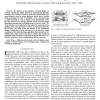195 search results - page 17 / 39 » The effect of faults on network expansion |
GI
2003
Springer
14 years 18 days ago
2003
Springer
: The Byzantine failure model allows arbitrary behavior of a certain fraction of network nodes in a distributed system. It was introduced to model and analyze the effects of very s...
ISCA
2007
IEEE
14 years 1 months ago
2007
IEEE
High availability is an increasingly important requirement for enterprise systems, often valued more than performance. Systems designed for high availability typically use redunda...
COMPSAC
1998
IEEE
13 years 11 months ago
1998
IEEE
Middleware implementation of various critical services required by large-scale and complex real-time applications on top of COTS operating system is currently an approach of growi...
JSAC
2008
13 years 7 months ago
2008
Abstract-- We propose a quasi-dynamic network design algorithm considering traffic growth in multi-layered photonic networks that consist of electrical paths and optical paths. The...
ICDCSW
2003
IEEE
14 years 21 days ago
2003
IEEE
The advancement of wireless communication and mobile telecommunication has made mobile commerce possible. In the retail business under the evolving market, the users would like to...

